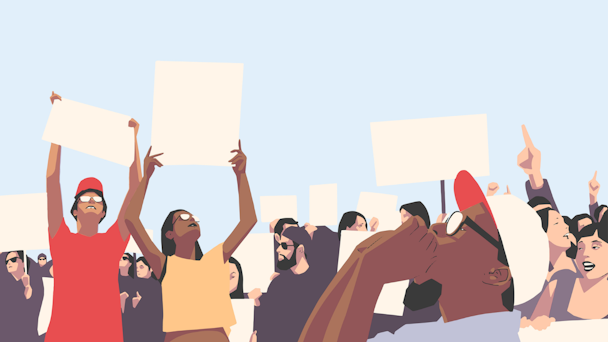Musk is right: Twitter should be treated like a public square
If Elon Musk is right about one thing, it's that Twitter is no longer merely a platform — it's a public square that gives a voice to digital citizens of all persuasions, backgrounds and beliefs, argues Dr Emily Edwards, technologist and assistant professor of digital humanities at St Francis College. But this doesn't mean that hate speech and misinformation get a free pass, she writes; it means that we need better frameworks for regulating communication in public spaces on the internet.

/ Adobe Stock
Elon Musk, Tesla chief executive, erstwhile partner of Grimes and child of a South African emerald baron, has now acquired Twitter in a $44bn deal. As a digital humanities practitioner and researcher who studies social media platforms and the mainstreaming of far-right hate-speech globally, I have a particular interest in this development.
What I find more troubling than Musk’s takeover of the ninth-largest social media platform — which hasn’t turned a profit for years — however, is user concern over this privatization and subsequent commitment to leave the platform. Qualitatively, I’ve seen Twitter users musing about Musk’s privatization of Twitter as analogous to the burning of the Library of Alexandria. Quantitatively, curious about the scope of discontent, I scraped some data, finding over 150,000 mentions of “leaving Twitter” just this past weekend.
However, talk of “leaving Twitter,” encapsulated by the fear that Musk’s purchase of the platform will dangerously decrease content moderation, fundamentally fails to capture the primary issue with social media platforms and the unchecked spread of hate-speech. The primary issue is that we still view Twitter as a platform and not a digital public space.
Musk himself called Twitter a “digital town square” in his Tweet announcing the acquisition of the platform. Musk and I agree on very little — his appreciation for Grimes being one point — but here he’s also correct. Twitter, Facebook, Instagram and Tik Tok are today’s digital public spheres. And they should be regulated as such.
What outrage over Musk’s takeover illustrates, along with subsequent discussion of departing from the platform in protest, is that in this digital moment, we are unable as a society to imagine a structural political solution to a structural political problem — the way in which political discourse and communication has been platformized and relegated to corporatized spaces.
The myopia over Musk’s takeover also ignores the current reality that Twitter in particular, as I’ve found in my research, is already a bastion of anti-Semitic, Islamophobic, racist and misogynistic hate speech. And this is by design.
Twitter’s content moderation policies are designed to strategically turn a blind eye to extreme speech. Extreme speech, such as hate speech, promotes more engagement. We need to go no further than Twitter’s own Hateful Conduct Policy to see that pre-Musk’s purchase, Twitter slyly bans only repeated instances of violent harassment.
Nonprofit organizations, women journalists and Black celebrities highlighted the endemic nature of virulent harassment and hate speech on the platform long before Musk expressed interest in purchasing Twitter. The impulse to leave Twitter now — as if this is the last straw — suggests not only a disregard for Twitter's documented history of disinterest in moderating user communications, but it also suggests a lack of imagination in solving the problem. It evidences a desire to see participation on social media through the lens of individual consumerism.
Elon Musk says Twitter is a digital town square. Currently, it is a platform. Feminist philosopher Nancy Fraser defined a public sphere as “a theater in modern societies in which political participation is enacted through the medium of talk." Musk has inadvertently agreed in saying, “Free speech is the bedrock of a functioning democracy.” But free speech is not screaming into a vacuum.
American social and literary theorist Michael Warner, in helping elucidate this problem, has argued that “all public addressees have some social basis." A digital public square, or sphere, depending on our geometric preference, is only meaningful when it is conceptualized as a space for social and political communication.
Leaving Twitter en masse is not the solution to the crisis of either imagined censorship or actual hate speech in the digital public square that is Twitter. The solution is to treat social media platforms like the public spaces they are and to ensure that such public spheres are structured and governed according to laws and standards of our social democratic societies.
Germany gives us one potential model in structuring the public sphere to enable functional and free social communication. It has some of the strictest legislation concerning anti-Semitic hate speech in Europe. The European Union more broadly has worked to enact hate speech regulations on the internet with limited success. These models should be taken as points of departure in regulating Twitter and other social media platforms.
Leaving Twitter, like leaving society, is a myth. It suggests that our participation in these digital spaces is merely a matter of consumer choice — rather than a question of how we connect, communicate and engage as digital citizens. Rather than migrating to a friendlier Discord channel or hopping over to TikTok, as digital citizens, we must seize the town square back through the implementation of comprehensive legislation.
Dr Emily Edwards is assistant professor of digital humanities at St Francis College.
